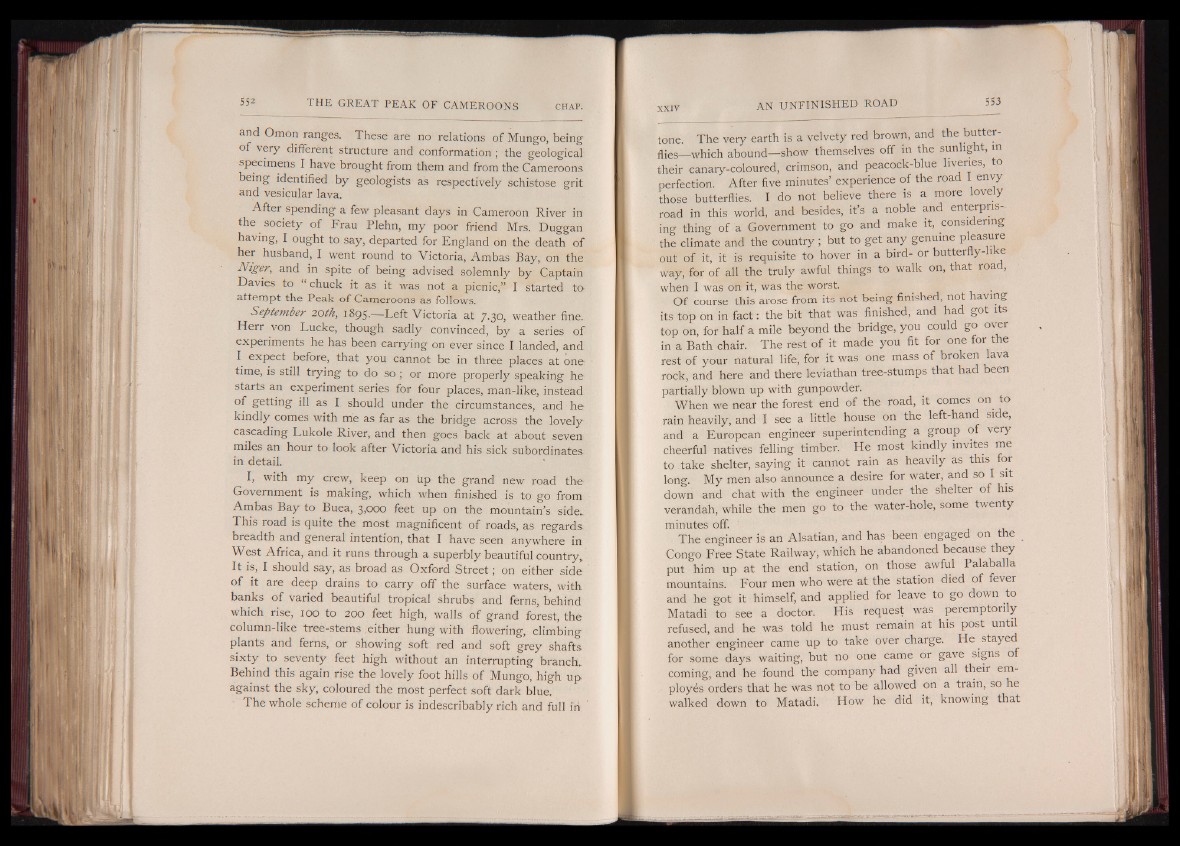
and Omon ranges. These are no relations of Mungo, being
of very different structure and conformation; the geological
specimens I have brought from them and from the Cameroons
eing identified by geologists as respectively schistose grit
and vesicular lava.
After spending a few pleasant days in Cameroon River in
the society of Frau Plehn, my poor friend Mrs. Duggan
having, I ought to say, departed for England on the death of
her husband, I went round to Victoria, Ambas Bay, on the
Niger, and in spite of being advised solemnly by Captain
Davies to “ chuck it as it was not a picnic,” I started to
attempt the Peak of Cameroons as follows.
September 20th, 1895.— Left Victoria at 7.30, weather fine.
Herr von Lucke, though sadly convinced, by a series of
experiments he has been carrying on ever since I landed, and
I expect before, that you cannot be in three places at one
time, is still trying to do s o ; or more properly speaking he
starts an experiment series for four places, man-like, instead
of getting ill as I should under the circumstances, and he
kindly comes with me as far as the bridge across the lovely
cascading Lukole River, and then goes back at about seven
miles an hour to look after Victoria and his sick subordinates
in detail.
I, with my crew, keep on Up the grand new road the
Government is making, which when finished is to go from
Ambas Bay to Buea, 3,000 feet up on the mountain’s side.
This road is quite the most magnificent of roads, as regards
breadth and general intention, that I have seen anywhere in
West Africa, and it runs through a superbly beautiful country,.
It is, I should say, as broad as Oxford Street j on either side
of it are deep drains to carry off the surface waters, with
banks of varied beautiful tropical shrubs and ferns, behind
which rise, 100 to 200 feet high, walls of grand forest, the
column-like tree-stems either hung with flowering, climbing
plants and ferns, or showing soft red and soft grey shafts
sixty to seventy feet high without an interrupting branch.
Behind this again rise the lovely foot hills of Mungo, high up
against the sky, coloured the most perfect soft dark blue.
The whole scheme of colour is indescribably rich and full in '
tone. The very earth is a velvety red brown, and the butterflies—
which abound— show themselves off in the sunlight, in
their canary-coloured, crimson, and peacock-blue liveries, to
perfection. After five minutes’ experience of the road I envy
those butterflies. I do not believe there is a more lovely
road in this world, and besides, it’s a noble and enterprising
thing of a Government to go and make it, considering
the climate and the country ; but to get any genuine pleasure
out of it, it is requisite to hover in a bird- or butterfly-like
way, for of all the truly awful things to walk on, that road,
when I was on it, was the worst.
Of course this arose from its not being finished, not having
its top on in fact : the bit that was finished, and had got its
top on, for half a mile beyond the bridge, you could go over
in a Bath chair. The rest of it made you fit for one for the
rest of your natural life, for it was one mass of broken lava
rock, and here and there leviathan tree-stumps that had been
partially blown up with gunpowder.
When we near the forest end of the road, it comes on to
rain heavily, and I see a little house on the left-hand side,
and a European engineer superintending a group of very
cheerful natives felling timber. He most kindly invites me
to take shelter, saying it cannot rain as heavily as this for
long. My men also announce a desire for water, and so I sit
down and chat with the engineer under the shelter of his
verandah, while the men go to the water-hole, some twenty
minutes off.
The engineer is an Alsatian, and has been engaged on the
Congo Free State Railway, which he abandoned because they
put him up at the end station, on those awful Palaballa
mountains. Four men who were at the station died of fever
and he got it himself, and applied for leave to go down to
Matadi to see a doctor. His request was peremptorily
refused, and he was told he must remain at his post until
another engineer came up to take over charge. He stayed
for some days waiting, but no one came or gave signs of
coming, and he found the company had given all their employés
orders that he was not to be allowed on a train, so he
walked down to Matadi. How he did it, knowing that